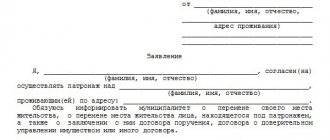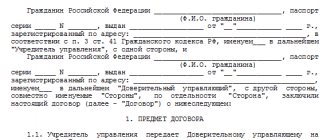Any citizen has the right to obtain guardianship over a person in need of care. If the candidate meets all the requirements and is ready to give part of his life for the benefit of another person, then the guardianship authorities approve the corresponding status. The procedure for appointing a patron depends on the category to which the ward belongs. If it is not so difficult with minors and partially capable elderly people, then with disabled people suffering from mental illnesses everything is much more difficult. So, how do you take custody of a mentally ill person?
Guardianship: general concepts and features
The concept of “capacity” means that a person has reached the age of majority and can adequately think, make decisions and manage property.
Incompetent people are children under 18 years of age or mentally ill citizens. In the first case, the responsible persons are the parents. In their absence due to deprivation of parental rights or death, the guardianship authorities will appoint a guardian or trustee (after 14 years). Assigning the status of “incapacitated” to an adult suffering from a mental disorder occurs through the courts. Within 3 days from the announcement of the decision, documents must be delivered to the Public Prosecutor's Office with a requirement to find a guardian for the citizen deprived of legal capacity. The role of the person appointed as a guardian is to represent the rights of the ward and care for him (buying clothes, food, cooking, cleaning). The expenditure of funds (benefits, pensions, alimony) of an incapacitated citizen occurs exclusively for his needs. The person who has been given guardianship rights must report to the PLO about all actions. It is unacceptable to freely dispose of the property of a ward. The exception is cases when the alienation transaction (sale, exchange, lease) will benefit the ward.
Any person who meets the requirements of the guardianship authorities has the right to formalize guardianship, but the emphasis is placed specifically on close relatives (brothers, sisters, spouses, parents). The decision is justified by the low probability of selfish actions and rapid adaptation to the chosen representative.
It is not necessary to provide full care for mentally ill people in all cases. The court may find the defendant only partially incompetent. Guardianship officials will have to find a trustee who will look after the ward and give the right advice. The severity of the disease can be assessed by conducting a psychiatric examination. Minor deviations do not even require the intervention of authorized bodies.
Guardianship of patients with schizophrenia must be formalized without fail. If during the proceedings it was established that an incapacitated citizen could do something to himself or cause harm to others, then he will be placed in a special medical institution for care and treatment.
Consideration of the case
In preparation for the trial, the judge orders a forensic psychiatric examination to determine the person’s condition. If a citizen evades it, he may be forcibly admitted to a hospital for examination.
A citizen in respect of whom a process for deprivation of legal capacity is being conducted must be invited to the court hearing. He is given the opportunity to express his opinion on the case, he has the right to invite a representative by proxy to protect his interests.
If this person cannot come to the courtroom for health reasons, then the court hearing is held at his location in a psychiatric hospital.
Also taking part in the court hearing are:
- the person who initiated the process;
- prosecutor's officer;
- guardianship officer.
During the process, the court hears explanations from the initiator of the process, a representative of the prosecutor's office, an employee of the guardianship authority, as well as explanations from the citizen himself against whom the case is being conducted. The court analyzes the medical reports available in the case and the results of the examination.
The judge may also call witnesses, such as family members of a citizen suffering from a mental disorder. The psychiatrist who conducted the examination may be invited to provide clarification.
As a general rule, the case is considered within three months. However, in some cases (for example, if difficulties arise with the examination), this period is extended.
The legislative framework
The legislation of the Russian Federation provides for guardianship of an incapacitated citizen in the following articles:
| Law | Description |
| Article 21 of the Civil Code | Description of the concept of “capacity”. |
| Article 29 of the Civil Code | Procedure after declaring a citizen incompetent. |
| Federal laws | Permissible benefits and payments to incapacitated people. |
| Law on Consumer Protection | Criteria for examining a mentally ill person. |
Requirements for candidates
A person who wants to become a guardian of a mentally ill citizen must have certain personal qualities (patience, attentiveness) and meet the requirements of the guardianship authorities:
- do not suffer from infectious pathologies;
- have no criminal record and no addictions (alcohol, drugs);
- be over 18 years of age;
- have housing suitable for maintaining the ward;
- obtain a certificate of absence of life-threatening diseases;
- be willing to perform their duties voluntarily.
If the candidate’s parental or guardianship rights were previously taken away, the guardianship authorities will be forced to reject the application. If all criteria are met, the likelihood of a positive decision is high.
What category of persons cannot be guardians for mentally ill people?
Not everyone can become a guardian
In our state, the main document, which clearly states all the requirements for guardians, is the Civil and Family Codes. It is here that all the rights and responsibilities of guardians are spelled out very clearly. There is also a list of persons who do not have the right to engage in guardianship activities. These include:
- Individuals who abuse alcoholic beverages and drugs.
- Persons who were previously removed from performing guardianship duties due to neglect of a patient or commission of unlawful acts.
- Persons deprived of parental rights.
- People with serious health problems
This issue is described in more detail in paragraph 3 of Article 146 of the RF IC. This document states that when choosing a guardian, personal qualities, ability to fulfill obligations, and also personal attitude towards the patient are taken into account.
Liabilities
A mentally ill citizen who is found incompetent during a trial must be under the constant supervision of a responsible person appointed by the PLO. The list of responsibilities of a person who has received guardianship rights is as follows:
- Conclude transactions and conduct business on behalf of your ward. Usually the point is about representing rights in court, purchasing basic necessities and paying utility bills.
- To care for the person under care, that is, to monitor his health, hygiene, living conditions and nutrition. The caregiver will have to do laundry, cleaning, and cooking as needed.
- Use the funds of a mentally ill person to meet his needs. An expense report is compiled towards the end of the year and submitted to the guardianship authorities.
If a person authorized to care for an incapacitated person discovers partial or complete restoration of the consciousness of the ward, then a petition is filed for a medical examination. If positive changes are identified, it is possible to return the status “competent” through the courts.
According to Art. 1076 Civil Code, people caring for mentally ill citizens are required to be responsible for the actions of their wards. Any damage caused by an incapacitated person must be compensated by his guardian.
Legal rights of a guardian
Guardianship implies not only an extensive list of responsibilities, but also rights:
- Enjoy benefits guaranteed by the state for performing your duties.
- Protect the interests of an incapacitated citizen in any controversial situations.
- Use funds and income from the property of the ward for his own benefit.
- Donate property or let a ward use it free of charge.
- Receive monthly payments from the state to compensate for the guardian’s time.
Any actions aimed at obtaining personal benefit at the expense of money or property of an incapacitated person are strictly prohibited. If the guardian does not fulfill his duties in good faith, he will be punished. Usually the court imposes punitive damages or revokes the guardianship rights.
Transactions regarding the rental, purchase or sale of property of a mentally ill person are permissible only with the approval of the guardianship authorities. The guardian does not have the right to make such decisions independently.
A person who has guardianship rights cannot inherit the property of the ward. An exception to the rules is when, before a verdict of incapacity is rendered, a citizen has filled out the relevant documents (inheritance agreement).
Privileges
If a person caring for a mentally ill citizen is unable to work, then the state will pay him benefits. It is presented in the form of a pension supplement and amounts to 1,200 rubles. To receive compensation, you must provide the required package of documents to the pension fund:
- statement of the person acting as a guardian;
- ID card and work book (guardian and ward);
- verdict of the PLO on granting guardianship to an incapacitated citizen;
- documents confirming that the guardian does not receive any payments.
You can find out more details from the pension fund employees.
If a person receives alimony, any benefits, a scholarship, or has other official income, then he is not entitled to compensation. Guardianship of a mentally ill person has its advantages, which are represented by state-guaranteed benefits:
- There is no need to pay for travel on public transport if the guardian travels with the ward.
- An incapacitated citizen has the right to receive a referral for free sanatorium treatment.
- Only half of the required amount of tax assessment for the purchase of a passenger car is paid.
- The notary charges the guardian only 50% of the full cost for his services.
- Utility bills are only half paid.
- A person fulfilling a guardianship duty may receive free legal advice.
- When filing a claim with the court for damages in the amount of up to 1 million rubles, you will not have to pay the state fee.
A clear advantage for able-bodied people is the length of service accrued for guardianship of an incapacitated citizen. For 1 year of performing duties, you can receive 1.8 pension points. In the future, the guardian will be entitled to pension payments.
Responsibility
Administrative responsibility plays an important role, and it is involved if the guardian does not perform his duties well enough.
Criminal
Criminal liability is a very serious thing. A guardian may be brought to it if he causes intentional harm to his ward in order to quickly take possession of his property.
Read what documents are needed to register guardianship. Is it possible to obtain guardianship for an elderly person? Information here.
How much do they pay for guardianship of a group 1 disabled person? Details in this article.
Deprivation of legal capacity of a mentally ill citizen
People over 18 years of age can be assigned “incompetent” status through legal proceedings.
Before filing a claim, it is necessary to obtain the result of a medical examination in a psychiatric hospital. The patient can undergo all tests voluntarily, having previously signed a consent, or forcibly if there is a risk of harm to himself or others. Having received the results of the examination, you can proceed to drawing up an application. A narrow circle of people have this right:
- Relatives.
- A representative of a hospital or boarding school housing a mentally ill person.
- Representative of the guardianship authorities.
- Employees of the medical institution in which the citizen is listed as a patient
Trial
According to statistics, in Russia, guardianship is most often granted to the relatives of a mentally ill citizen. The process involves contacting legal authorities. Thus, a statement of claim is filed with the local court authorities at the address where the patient is registered or where he is being kept for treatment.
The text of the application must include a detailed explanation of the person’s mental state, confirmation of the fact that he is unable to independently take responsibility for his actions.
Also, the following documents are attached to the paper:
- certificate confirming relationship;
- medical report from a psychiatrist;
- written statements of witnesses;
- receipt of payment of the state fee.
It is important to understand that the trial must be conducted in the presence of the person whose mental condition is being examined. If this is not possible for health or safety reasons, an off-site hearing will be scheduled at the facility where the patient is located.
Features of registration of guardianship
The resulting court verdict is sent to the PLO. A person who wishes to assume guardianship rights must provide the appropriate package of documents to the guardianship authorities:
- identity cards and personal accounts (guardian and ward);
- medical examination results;
- a certificate indicating no criminal record;
- characteristics from the place of work;
- handwritten autobiography;
- certificate from the pension fund (protected);
- the judge's verdict recognizing the incapacity (of the ward);
- a certificate confirming the disability of the person requiring guardianship;
- documents proving the applicant’s income and housing;
If other relatives are registered in the housing to which the candidate for guardianship intends to bring a mentally ill person, then their written consent will be required. After studying the provided documents, the PLO will conduct an examination of the expected future place of residence of the incapacitated citizen and make a final decision, based on the results obtained.
What documents will be required?
Since the procedure for establishing guardianship is a serious step, the candidate must fulfill all the conditions prescribed by law. The legal acts define a list of acts that need to be submitted to O&P employees for consideration. These include:
- expert opinion on the presence of mental illness;
- a court decision on the loss of legal capacity of the ward;
- personal statement;
- applicant's passport;
- certificates indicating the candidate’s income at the place of employment;
- a medical certificate confirming that the applicant meets the requirements for a guardian;
- consent of family members to accept a sick ward into the family;
- certificate of registration of the union (divorce);
- autobiography.
Cancellation of guardianship rights
Independent termination of guardianship is possible only upon the death of the guardian or ward. In other cases, representatives of the PLO must have good reasons for this:
- The person appointed for guardianship is no longer able to fulfill his duties due to deterioration in health, for example, if he became ill with a severe infectious pathology, became disabled, or was forced to move.
- The ward has become dangerous to others or himself, which is the reason for his transfer to a special medical institution.
- The judge made a decision to restore legal capacity at the request of the guardian or guardianship officials.
- The person who has been granted guardianship rights fails to cope or abuses the responsibilities.
A representative of the PLO, citing the grounds for annulment of guardianship, has the right to submit an application to the prosecutor's office or the district court department. Further actions depend on the circumstances of the case.
A person who wants to care for a mentally ill citizen who has been declared incompetent by a court must submit an application to the OOP staff. They will familiarize themselves with the situation and, upon approval of the candidacy, will grant the applicant guardianship rights. The responsibilities of the guardian will include caring for the ward and representing his interests. As compensation, the state will provide certain benefits and payments to the person caring for a mentally ill person.










